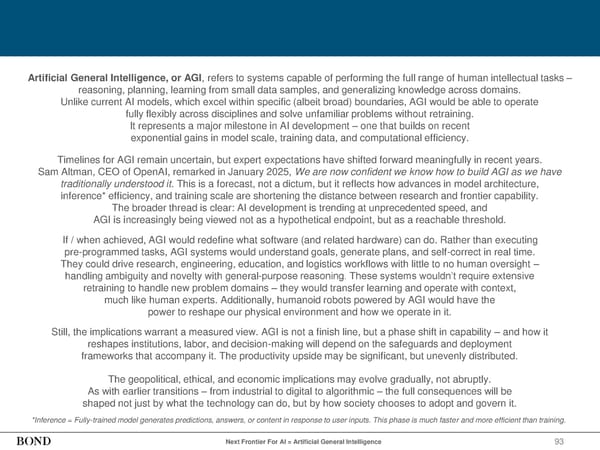93 Artificial General Intelligence, or AGI, refers to systems capable of performing the full range of human intellectual tasks – reasoning, planning, learning from small data samples, and generalizing knowledge across domains. Unlike current AI models, which excel within specific (albeit broad) boundaries, AGI would be able to operate fully flexibly across disciplines and solve unfamiliar problems without retraining. It represents a major milestone in AI development – one that builds on recent exponential gains in model scale, training data, and computational efficiency. Timelines for AGI remain uncertain, but expert expectations have shifted forward meaningfully in recent years. Sam Altman, CEO of OpenAI, remarked in January 2025, We are now confident we know how to build AGI as we have traditionally understood it. This is a forecast, not a dictum, but it reflects how advances in model architecture, inference* efficiency, and training scale are shortening the distance between research and frontier capability. The broader thread is clear: AI development is trending at unprecedented speed, and AGI is increasingly being viewed not as a hypothetical endpoint, but as a reachable threshold. If / when achieved, AGI would redefine what software (and related hardware) can do. Rather than executing pre-programmed tasks, AGI systems would understand goals, generate plans, and self-correct in real time. They could drive research, engineering, education, and logistics workflows with little to no human oversight – handling ambiguity and novelty with general-purpose reasoning. These systems wouldn’t require extensive retraining to handle new problem domains – they would transfer learning and operate with context, much like human experts. Additionally, humanoid robots powered by AGI would have the power to reshape our physical environment and how we operate in it. Still, the implications warrant a measured view. AGI is not a finish line, but a phase shift in capability – and how it reshapes institutions, labor, and decision-making will depend on the safeguards and deployment frameworks that accompany it. The productivity upside may be significant, but unevenly distributed. The geopolitical, ethical, and economic implications may evolve gradually, not abruptly. As with earlier transitions – from industrial to digital to algorithmic – the full consequences will be shaped not just by what the technology can do, but by how society chooses to adopt and govern it. *Inference = Fully-trained model generates predictions, answers, or content in response to user inputs. This phase is much faster and more efficient than training. Next Frontier For AI = Artificial General Intelligence
 2025 | Trends in Artificial Intelligence Page 93 Page 95
2025 | Trends in Artificial Intelligence Page 93 Page 95
